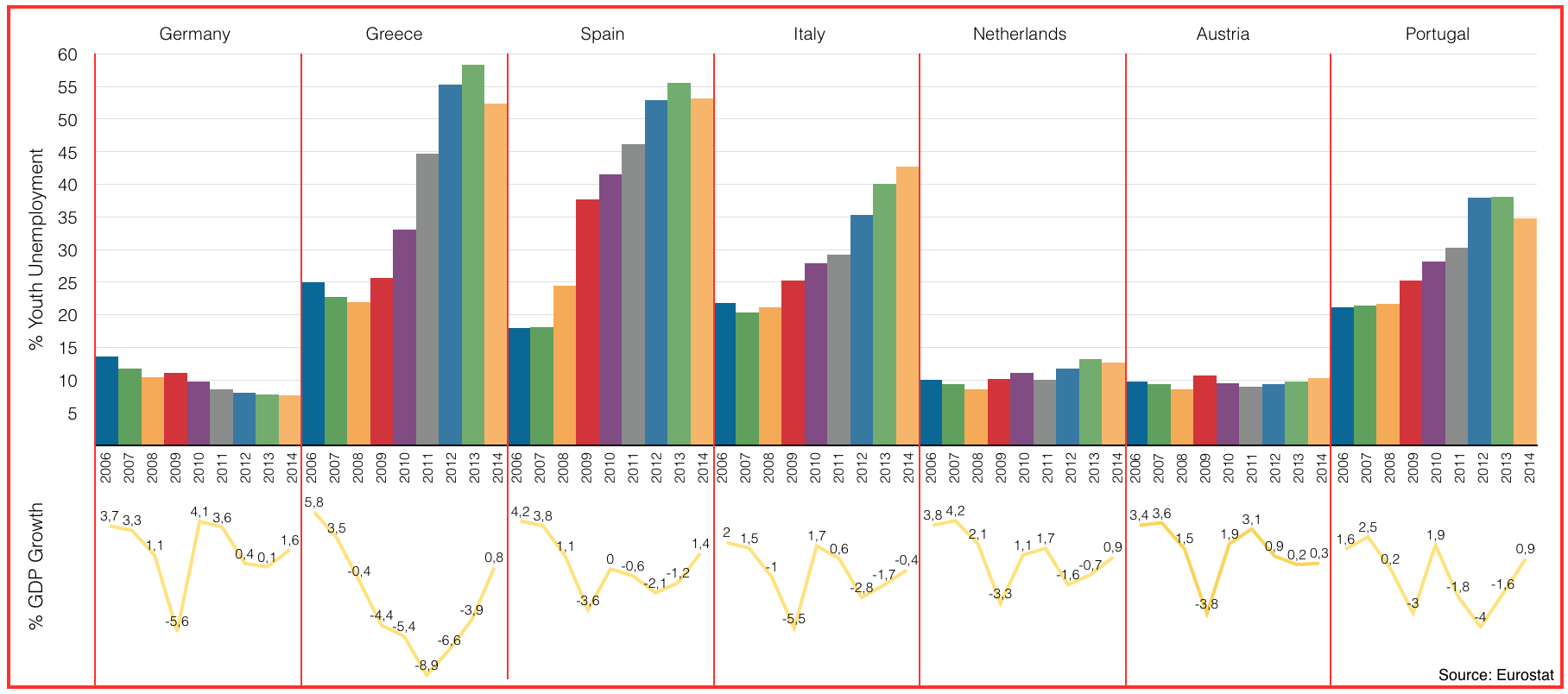Job creation is one of the most important challenges facing society. This is true from both the social and economic points of view, particularly amid an economic crisis as persistent as the one that hit the Western world in the opening decade of the 21st century. One of the most dramatic consequences of this crisis has been the rise in unemployment. Not all countries have been affected in the same way by this trend; instead, it has largely depended on the measures taken to combat it. No one disputes the need to generate employment and bring unemployment rates down as low as possible. The problem lies in the measures used to achieve that goal.
The “welfare state” model in European countries is largely based on the social security withholdings of employed persons. Therefore, when unemployment increases, all of that obviously gets put at risk, especially the pension system, by directly drawing from contributions by the working population.
It is certainly a challenge to find the right measures for stimulating employment, although efforts should be made to take steps down the pathways that will lead us to them. And there are very tangible examples of such measures that countries with high unemployment ought to learn from .

1. Broad social consensus
The countries that have best handled the economic crisis and unemployment have started with a broad social and political consensus that allowed them to design specific, sometimes very strict measures to address the real problem:
- Germany used the “Hartz Commission” (2003-2005) to stimulate the creation of employment
- Holland‘s “Wassenaar Arrangement” (1982) allowed employees to hold onto their jobs by taking pay cuts in exchange for reduced working hours. Holland also approved a law on flexible work hours (2000), which gave workers the right to apply for an increase or decrease in the length of their workday
- Austria‘s Abfertigung neu agreement (2003), regulated by the law known as Betriebliches Mitarbeiter- und Selbständigenvorsorgegesetz (BMSVG), introduced an important change in the mandatory severance pay system and in facilitating a future supplement to pensions.
A social consensus, nonexistent in Portugal, Spain, Italy and Greece, promoted by the governments would have the full support of employers and trade unions and be comprehensible to political adversaries. The indispensable factors for dealing with the situation have been the broadening of perspectives, understanding and effort—particularly among business leaders, the key players for job creation.
2. Culture of training
A concerted effort to reduce youth unemployment and recover a generation that is struggling to find answers, in a society that is so wrapped up in itself that it is forgetting vital aspects such as training, professionalism, initiative and the audacity of a young generation so eager to join the business world, which is the undisputed center of modern society. The only country that has been able to decrease youth unemployment during the years of crisis and bring it below 8% has been Germany, thanks to a culture of training established over time, which got companies involved in the process of recruiting young people.
3. Part-time work
The increase of stable part-time work, in which the Netherlands is at the top of the class with 50% of contracts being part time, well above the European average of just over 20%. The Dutch promoted this type of contract in the early 1980s, as a means of balancing work and family or leisure, at a time when the rate of women entering the labor market was swiftly rising; in the 1990s, they viewed these contracts as an effective way of combating the crisis and promoting employment; and in the 2000s, they granted them all the same rights as full-time contracts.
4. Flexibility
The internal flexibility of companies has played a key role in productivity, in overcoming the toughest moments of the crisis and the ability to find answers to prevent business closures and massive layoffs. One real burden has been the rigidity imposed by a unionism that is anachronistic and incapable of adapting to the times in which we live, especially in the countries of Southern Europe.
5. Active employment policies
Severance payouts have given way to the social protection of the unemployed, as seen in Denmark and Austria, and the decisive push for active employment policies, as in Germany, which have focused on adapting the training of the unemployed and young people to meet the needs of companies… or in other words, making supply meet demand.
A democratic society must have a sense of responsibility and sensitivity to take all citizens according to their possibilities and their social role, give them a hand and help them demonstrate through their behavior the values that are part of the Western culture. Solidarity with oneself should give way to solidarity with others, especially with those who need it most. Those who some call the “heart and soul” of society are put to the test in difficult times, when what truly matters are not words, but actions.



Flexibility is for me the key, but not only for the employees, also for the high executives. Unions have too power in some countries and they are stopping any initiative to change old systems…